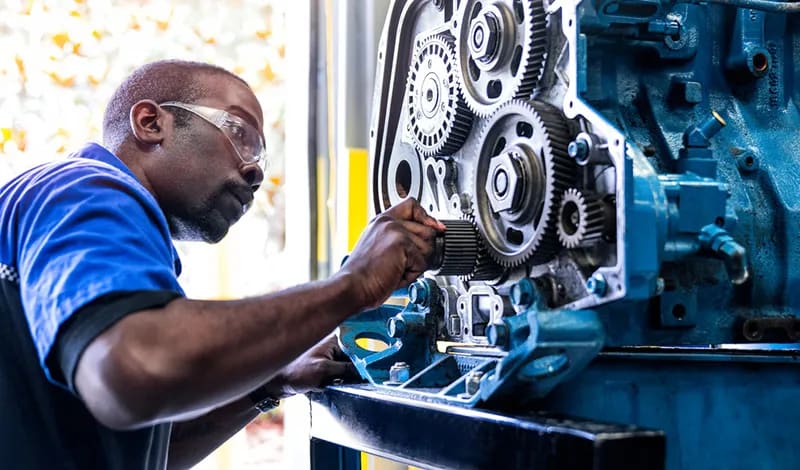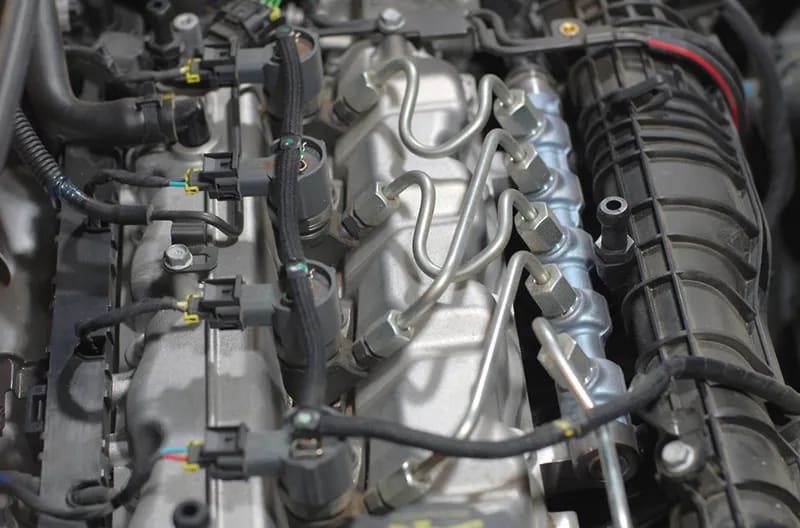How Long Does It Take To Become a Diesel Mechanic?
How long does it take to be a diesel mechanic? Get the answer here! Learn more about this career path, how long it can take and about diesel training at UTI.
Diesel Technology encompasses diesel-powered engines and machines as well as their mechanical and technical systems. Those in the field are interested in how diesel engines work and how to maximize their efficiency.
Those working in the field understand vehicle electronic systems, preventive maintenance, steering and suspension, brake systems and chassis and more. Most begin their studies at a diesel mechanic training program, like the one at Universal Technical Institute (UTI). UTI’s Diesel Technology program provides students with a foundational understanding that prepares them to pursue careers where they can continue learning and contributing to the field.1
But, what does contributing to the field look like? Successful diesel technicians often stay ahead of the curve by keeping in the know about advanced diesel technology. Before jumping into what those advancements are, it will help to have some context on the history of the diesel engine and how things started.
In the 1870s, the main supplier of power for factories and trains was steam. There were even some early motor vehicles powered by steam, along with internal combustion engines.
At this time, Rudolph Diesel was a student learning about thermodynamics, and he got the idea to create a highly efficient engine. This led to him develop what would become known as the diesel engine. He received patents for designs in the 1890s, and the first prototype was completed in 1893.
After many improvements and tests, Diesel produced successful results with his engine in 1897. There was an efficiency increase of 16.2% compared with steam engines being used at the time.
A diesel engine is considered an internal combustion engine, just like a gasoline engine. Fuel is burned inside the combustion chamber, where power and torque are created. Modern diesel engines can be up to twice as efficient as gasoline engines, allowing drivers to go farther on the same amount of fuel.
Even though diesel-powered engines are more efficient and produce less CO2 than regular gasoline engines, there are still ways to make improvements to them.

Several improvements and enhancements are being created in the industry to help increase operational efficiency and minimize the amount of emissions these engines produce. Some diesel technologies have the benefit of helping with the combustion rates of diesel fuel as well.
Cetane is a chemical compound that’s found naturally in diesel. It’s highly flammable, and it’s the industry-standard measurement for evaluating the quality of fuel combustion.
This measure of ignition quality is known as the cetane number, or CN. Some diesel engine performance factors that are influenced by the cetane number are: cold starting, engine warmup, acceleration and exhaust-smoke density. Lowering the cetane number lowers the compression ignition temperature, thereby reducing ignition lag.
Cetane additives (aka cetane accelerators) are used to increase the cetane value of a fuel. However, increasing the cetane value usually reduces fuel density and therefore fuel mileage. Some manufacturers recommend the use of cetane improvers during extremely cold conditions.
A higher amount of cetane leads to the fuel igniting in the combustion chamber more quickly after being injected. Fuel is ignited at a lower temperature, and the result is accelerated fuel combustion.
The common rail fuel injection system works by reducing the size of fuel droplets injected into the combustion chambers of a diesel engine. Smaller droplets burn more completely and help increase oxygenation. The result is a higher level of compression ignition and combustion with the diesel fuel.
The use of the common rail fuel injection system dates to 1997 for diesel cars and marine engines, and to the mid-2000s for diesel trucks and pickups, but it’s still considered modern technology in the diesel industry.

Before then, diesel equipment technology would use direct injection fuel systems that would cause large drops of fuel to enter the chamber. The common rail fuel injection system controls the emitted droplet-size fuel to optimize engine performance under almost any temperature, load or speed condition.
Diesel oxidation catalysts (DOC) work to help convert carbon monoxide and hydrocarbons (unburned fuel) into a less harmful mixture of carbon dioxide and water.
This process helps increase the nitrogen dioxide content to support the performance of the SCR catalyst and promote passive regeneration of diesel particulate filter (DPF). Ultimately, this decreases emissions produced by diesel engines.
Selective catalytic reduction (SCR) is another emissions control process used as a nitrous oxide reduction strategy. Diesel exhaust fluid is injected into the exhaust over a catalyst in a decomposition chamber. The fluid reacts with the precious metals in the catalyst, allowing the nitrous oxide to be converted into harmless nitrogen and water.
Once this process is complete, the nitrogen and water are expelled through the vehicle’s tailpipe. SCR is a cost-effective and fuel-efficient technology that works to help reduce diesel engine emissions.
Advanced diesel technology helps make some of the world’s most important industries more efficient. Diesel technicians often work in these industries, too.
The trucking and transportation industry utilizes diesel-powered vehicles, like semis and tractor-trailers, to transport necessary goods ranging from gasoline to perishable items like produce.
Railway vehicles primarily run on diesel, and like the trucking and transportation industry, the railroad industry plays a crucial role in transporting goods. Railway vehicles carry bulk commodities, like chemicals, vehicles, grain and fertilizer farther and more efficiently than the trucking industry can.
Most ships have diesel engines and diesel generators that power things like lights and fans. The industry itself is responsible for transporting goods across the water. It plays a significant role in global trade and helps maintain the international supply chain.
The agriculture industry is critical to our food supply. Diesel is a reliable and efficient power source, so farm equipment like tractors, seeders and plows run on diesel.
Diesel engines can power far more than the vehicles already mentioned. Various industries rely on diesel generators to maintain power. This includes manufacturing, power plants, medical facilities, mining companies and more.
The technology used for diesel engines has better thermal efficiency and runs slower RPMs than gas engines, allowing for superior power and torque, longevity and fuel efficiency, which is particularly beneficial for heavy-duty transportation.
Diesel technology plays an important role in industries like power generation, transportation and agriculture, and the Bureau of Labor Statistics projects more than 25,000 estimated average annual diesel job openings in the U.S.!43
While diesel engines are more fuel-efficient than gas engines, resulting in lower CO2 emissions, they emit higher levels of particulates like nitrogen oxides. However, advancements in diesel technology, such as DOC and SCR, are working to reduce these emissions and make diesel engines cleaner.
It’s important when pursuing a career in the diesel industry to get training with relevant technology and best practices. The Diesel Technology program at Universal Technical Institute offers courses that can help give students hands-on experience.18 UTI also offers specialized diesel training programs with some of the biggest names in the industry, including Daimler Truck North America, Cummins and Peterbilt.15
At UTI, you can graduate in less than a year ready for a career in the diesel industry.1,7 Train to become a part of the future of diesel mechanics and request more information today!
Universal Technical Institute of Illinois, Inc. is approved by the Division of Private Business and Vocational Schools of the Illinois Board of Higher Education.